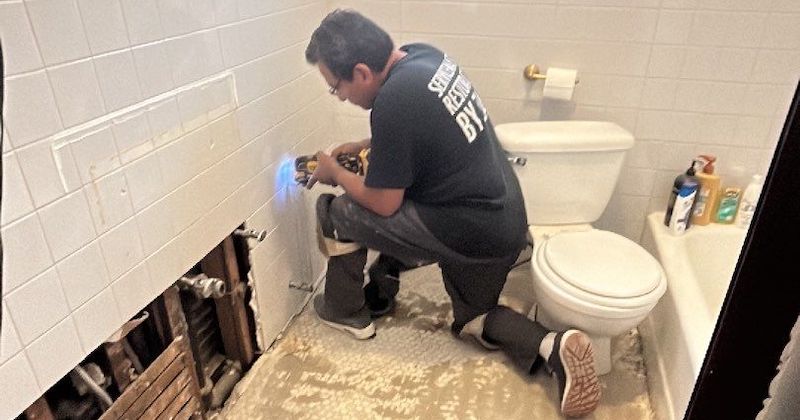A New Homeowner's Guide to Proper Bathroom Plumbing Care
A New Homeowner's Guide to Proper Bathroom Plumbing Care
Blog Article
What are your thoughts on 6 Essential Plumbing Checks for New Homeowners?

For brand-new home owners, understanding and preserving restroom plumbing can conserve both money and time by stopping costly concerns down the line. Below are some crucial bathroom plumbing ideas to help you keep whatever running efficiently.
Acquaint Yourself with the Key Shut-Off Shutoff
Recognizing where the major water shut-off shutoff lies in your house is critical. This permits you to swiftly switch off the water in case of significant leakages or throughout plumbing emergencies, protecting against considerable water damages.
Regularly Inspect for Leakages
Tiny leakages can result in huge issues. On a regular basis inspect under sinks, around bathrooms, and near plumbing components for any kind of signs of leaks. Look for wetness, tiny drips, or rust. Catching and fixing leaks early can avoid more significant damages and save water.
Don't Overlook Slow Drains
If your sink or bathtub is draining slowly, it's typically a sign of an obstruction creating. Addressing this very early can stop a total blockage. Make use of a plunger or a plumbing's snake to clear out particles. Prevent using chemical drainpipe cleaners as they can damage your pipes with time.
Know What Not to Flush
Commodes are not garbage disposals. Stay clear of purging anything other than bathroom tissue and human waste. Products like wipes, womanly hygiene items, and cotton swabs must be gotten rid of in the garbage to avoid clogs and sewer back-ups.
Install Strainers in Drains
Location strainers in your sink and tub drains to capture hair and other debris before they enter your pipes system. Cleaning the strainers frequently will aid avoid accumulation and keep water moving openly.
Maintain Your Hot Water Heater
Guarantee your water heater is readied to an appropriate temperature level (usually about 120 degrees Fahrenheit) to stop scalding and minimize power usage. Flush the storage tank each year to remove sediment build-up, which can reduce the effectiveness and life-span of your heater.
Update Your Fixtures
If your home has older components, consider upgrading to a lot more efficient designs. Modern bathrooms, showerheads, and faucets are made to use less water while supplying excellent pressure, which can considerably minimize your water expense and ecological impact.
Be Cautious with DIY Plumbing Fixes
While it's alluring to take care of all home repairs on your own, be cautious with pipes. Some concerns could call for expert proficiency, particularly if they include primary water lines or sewage system fixings. Hiring a professional can in some cases be more affordable than do it yourself, especially if it protects against further damage.
Plan For Winter
Shield your pipelines from cold during cold weather by protecting pipes in unheated areas like basements, attics, and garages. During extreme chilly, allow cold water drip from faucets offered by exposed pipes to help prevent freezing.
Schedule Regular Upkeep
Take into consideration organizing yearly examinations with an accredited plumbing technician. They can detect concerns that you may miss, such as covert leakages or damage on pipes and fixtures. Routine upkeep assists extend the life of your pipes system and can stop emergency situations.
Verdict
Understanding and maintaining your home's bathroom plumbing can prevent lots of usual problems. By following these important tips, you can ensure your shower room continues to be useful and efficient, conserving you money and time in the future.
Essential Plumbing Tips for Homeowners: Keep Your Pipes Flowing Smoothly
As a homeowner, understanding the basics of your plumbing system can save you time, money, and a lot of headaches. Plumbing issues can range from minor annoyances like dripping faucets to major problems like burst pipes that cause significant damage. This guide provides essential tips to help you maintain your plumbing system and tackle common issues.
Understanding Your Plumbing System
Supply System: Brings fresh water into your home from a municipal source or a well. Drain-Waste-Vent System: Removes wastewater and vents sewer gases outside. Fixtures and Appliances: Includes sinks, toilets, showers, dishwashers, and washing machines. Basic Maintenance Tips
Regular Inspections: Periodically check for leaks, corrosion, and other signs of wear and tear. Look under sinks, around toilets, and near water heaters. Know Your Main Shut-Off Valve: In case of a major leak, you’ll need to shut off the water quickly. Ensure everyone in your household knows where the main shut-off valve is located. Prevent Frozen Pipes: In cold climates, insulate exposed pipes and let faucets drip during extreme cold to prevent freezing. Use Strainers: Install strainers in sinks and tubs to catch hair, food particles, and other debris that can cause clogs. Common Plumbing Issues and Solutions
Clogged Drains:
Prevention: Avoid pouring grease down the drain and use drain screens to catch debris. DIY Fix: Use a plunger or a plumbing snake to clear minor clogs. For stubborn clogs, a mixture of baking soda and vinegar can sometimes help. Leaky Faucets:
Prevention: Replace washers and seals regularly. DIY Fix: Turn off the water supply, disassemble the faucet, and replace worn parts.

Book Service Now Report this page